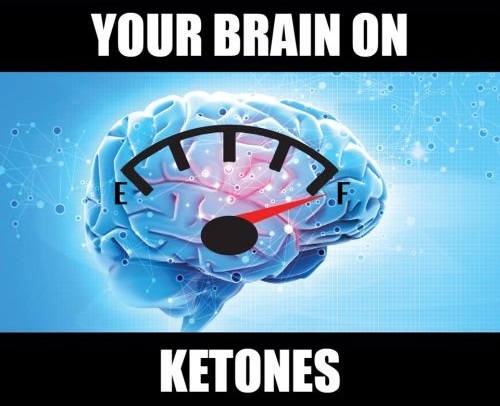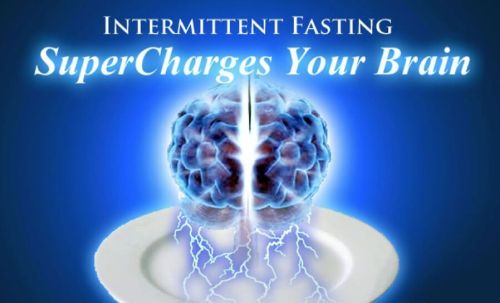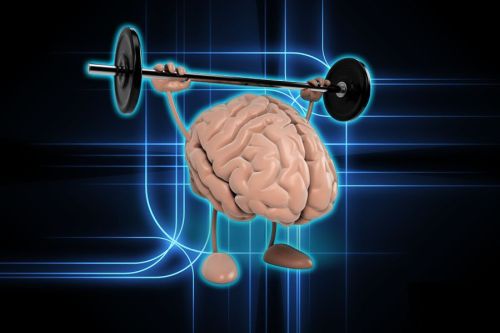
Do you want to unbelievably improve your brain function (boost mental clarity, alertness, cognition, concentration, perception, understanding, acumen, learning, memory, quick-wittedness and creativity)? This site will provide you with such biohacking tools as Intermittent Fasting (eating twice or once a day) and LCHF (low-carbs high-fats) food (avoiding fast carbohydrates - sugar, bread, pasta, potatoes, rice etc., and consuming fatty food in sufficient quantities - you will find detailed eating instruction in the page HOW TO START: A CRASH COURSE). The combination of Intermittent Fasting and LCHF changes the body functioning from the glycolysis state (when the eaten carbohydrates are the major source of energy) to the ketosis state (when the energy is taken mostly from ketones, which are produced from fat - consumed with food and deposited in your body). The internal mechanics are described here: HOW IT WORKS.
The removal of farinaceous foods solves a problem that is critical for many, because along with bakery products from your diet goes gluten! If you think that the gluten problem does not concern you since you do not have visible gluten intolerance (celiac disease), please read the article: The Symptoms of Gluten Intolerance You Haven’t Heard About. The book "Grain Brain. The Surprising Truth About Wheat, Carbs, and Sugar - Your Brain Killers" (pdf) - MUST READ!
From the site of University of California, San Francisco:
Ketones and ketoacids are alternative fuels for the body that are made when glucose is in short supply. They are made in the liver from the breakdown of fats. Ketones are formed when there is not enough sugar or glucose to supply the body's fuel needs.
From Quora:
I've seen noticeable improvements in cognitive function – feeling more sharp with increased mental energy.
DID YOU HEAR ABOUT SILICON VALLEY "BIOHACKERS"?
It's a community of high tech workers who fast and avoid carbohydrates for better brain functioning.
From Business Insider:
In Silicon Valley, whole groups of self-optimization-obsessed biohackers meet to collectively break their fast once a week, and executives at companies like Facebook say fasting has helped them lose weight and have more energy.
From The Star:
Does Silicon Valley know something we don’t? Other than all our personal information, pin numbers and Google searches, that is? Possibly, say some doctors who are endorsing fasting...
More and more executives are using Intermittent Fasting as a means to improve health and boost productivity.
Phil Libin, CEO All Turtles, former CEO Evernote (from his interview to The Guardian):
There's a mild euphoria. I'm in a much better mood, my focus is better, and there's a constant supply of energy. I just feel a lot healthier. It's helping me be a better CEO. Getting into fasting is definitely one of the top two or three most important things I've done in my life.
From JACK DORSEY (TWITTER CEO) REVEALS THAT HE EATS ONE MEAL A DAY:
Dorsey explained how he only eats one meal a day in the evening hours of between 6:30 Pm and 9 Pm. He also mentioned that his dishes are made up of vegetables such as asparagus, brussels sprouts, salad, and spinach. His meals also have protein such as fish, steak, and chicken. "The first time I did it, like day three, I felt like I was hallucinating. It was a weird state to be in. But as I did it the next two times, it just became so apparent to me how much of our days are centered around meals... During the day, I feel so much more focused… You have this very focused point of mind in terms of this drive... "
From BBC:
...on the days that they are not eating, they get more done in the office. They experience an enhanced sense of mental agility and are better able to focus on their work. They call themselves WeFast, an online community of so-called biohackers who believe that by tinkering with the biology of the human body, we can lead healthier and more fulfilling lives. Studies have found that different forms of fasting can have a powerful effect on the human body. They result in a vast array of changes, at a cellular level, affecting many metabolic systems, such as fuelling the brain and the way the body deals with stress. And while the evidence of the impact on work performance is anecdotal, many people who adhere to fasting regimes... report that they experience a heightened sense of alertness – similar to a runner's high. Laboratory studies suggest that biochemical changes in the brain could be the root cause. Mark Mattson, a professor of neuroscience at Johns Hopkins University, says his research suggests they lead to improved cognitive abilities. It is thought that people experience a greater sense of wellbeing when they start to burn body fat instead of carbohydrates from food...
Why Fasting Is Trending Among Tech Executives
From the site of Dr. Fung's clinic:
FASTING AND EUPHORIA
Many who fast have had the good fortune of entering into a state of euphoria. I’m one of them and I talk about it often.
Depending on how often I’m fasting, I can enter into this state before my first fasted sleep. I usually experience the euphoria when I wake up, after sleeping through my first night fasted.
So, what does this euphoria feel like, and what causes it?
First, allow me to describe the euphoria as best I can. For those of you who have not yet experienced it, it’s a worthy goal to strive for. When I enter a state of fasting euphoria, I have such a state of well-being that I don’t want to break my fast. As a matter of fact, my two longest fasts – 10 days and nine days – were unplanned, and came about as a direct result of waking each morning feeling so fantastic I had no desire to break the fast. So, I kept going.
My euphoria is a combination of three things: increased energy, clear thinking and elevated emotions.
The clear thinking gives me the ability to hyper-focus, which I take advantage of by planning organizational projects during my fasts. I organize entire rooms, organize files and plan upcoming trips during a fast. I can always count on the clarity.
The increased energy is caused, in part, by naturally-occurring, increased adrenaline whilst fasting. As a result, I need, on average, two hours less sleep each night. (I normally need seven but, when fasting, five is sufficient.) Are you sleeping less on a fast? Ask yourself if you are truly fatigued with less sleep. Chances are, on a fast, less sleep is fine and you have plenty of energy.
Elevated emotions… Wow, do I experience these on a fast! The positive, hope-filled sense of invulnerability and confidence is addictive – in a good way. I make decisions about my greatest adventures (for example, several solo cross-country motorcycle trips) and plan my most ambitious projects during this time.
Mindfulness is also a very powerful benefit of fasting. I find I’m able to focus on activities and I’m liberated from constantly thinking about (and eating) food. Fasting gives me a liberating sense of control, which is another type of “fasting high.” Fasting is a kind of separation of our physical selves in order to tap into higher realms of meaning.
What is the euphoria caused by?
The subjective benefits to fasting, including mental clarity, are caused by the rise in ketones in the system. In a fasted state, you are living on ketones, an entirely different fuel than glucose. Fasting retrains our body to convert energy from fats which boosts our natural energy levels. Living on ketones means fatty acids are converted into acetoacetate and BHB (beta hydroxybutyric acid), which are natural and excellent metabolic fuels. In a bio-chemical sense, BHB is similar to GHB (an illegal street drug) and there are medical and research journal articles theorizing that this is the reason we have such powerful euphoria. Ketones are also a super-fuel for the brain.
In conclusion, fasting causes physiological sensitization. Cellular response increases. These feelings are positively attributed to ketosis (when you produce ketones). When I fast, I always experience a general sense of well-being. It’s the best part of my fasting experience. I become delighted with life and filled with a sense of purpose and desire for adventure. It’s one of the main reasons I’ve continued to fast regularly for nearly four years now.
Source

BUT... HOW???
The main reason is switching to "more high octane" ketones. This is a very broad topic - pease google how ketones improve brain functioning, you will find a lot of very interesting articles.
Intermittent Fasting works wonders not alone but together with carbohydrates removal, so please read the already mentioned book ("Grain Brain: The Surprising Truth about Wheat, Carbs, and Sugar - Your Brain's Silent Killers" (pdf)). The book describes both the aspects very intriguingly!
And now, please watch these short videos:
The following videos talk about ketogenic diet - one of the popular ways to enter ketosis (in fact, it's a very strict version of LCHF which works even without Intermittent Fasting). So, these videos are absolutely relevant for our discussion:
Find more Youtube videos about ketones and brain.
NOT KETOSIS ONLY
Switching to "more high octane" ketones not the only way Intermittent Fasting works. It also improves your brain power by creating more brain cells. According to Dr Mark Mattson, a professor of Neurology at John Hopkins University, fasting has been shown to increase rates of neurogenesis in the brain. Neurogenesis is the growth and development of new brain cells and nerve tissues. Higher rates of neurogenesis are linked increase brain performance, memory, mood, and focus. One particular study showed that intermittent fasting (the researchers used a 16:8 schedule in the study) stimulated the production of new brain cells.
Intermittent Fasting boosts production of an important protein called Brain-Derived NeuroTrophic Factor (BDNF) which boosts memory, improves mood and learning. BDNF protects existing brain cells, and also governs and stimulates the formation of new neurons and the development of synapses and new connections (lines of communication) within the brain. Higher levels of BDNF lead to healthier neurons and better communication processes between these neurological cells (source). Low levels of BDNF are linked to dementia, memory loss and other brain processing problems (source). BDNF has been shown to play a role in neuroplasticity, which allows the brain to continue to change and adapt. It makes your brain more resilient to stress and more adaptable to change. Intermittent fasting has been shown to boost BDNF by 50–400%! From Newsweek:
The brain cells of mice who regularly fast may grow more than usual once they get food again, according to research presented at the Society for Neuroscience's annual meeting in November and first reported by New Scientist. One particular protein may be behind the growth: brain-derived neurotrophic factor (BDNF). In humans, BDNF may be involved in learning and memory. Levels of this protein tend to decline as a person gets older, especially if someone is diagnosed with a disease that can affect cognitive functions like Alzheimer's. However, levels of this protein increase by up to 50 percent in mice that have been fasting.

THINK TODAY ABOUT TOMORROW
Intermittent Fasting is not only a cognitive enhancer now - it can forestall cognitive decline in the future. It protects neurons from genetic and environmental stress factors during aging (source), increases insulin sensitivity, which benefits neurons that stimulate the production of enzymes that help cells cope with stress and fight against disease (source), can reduce issues with brain function and neurodegenerative disorders caused by inflammation (source), affects energy and oxygen radical metabolism, and cellular stress response systems, in ways that protect neurons against genetic and environmental factors to which they would otherwise succumb during aging (source).
A good review on the evidence suggesting dementia is a result of brain insulin resistance. Give your brain a break from glucose by feeding it ketones (if you don't know what ketones are, please read that):

This articles describes how fasting boosts neuronal autophagy and prevents stroke, Alzheimer's disease and age-related cognitive decline.
SO, WANNA IMPROVE YOUR BRAIN FUNCTION?
WELCOME TO THE PAGE HOW TO START: A CRASH COURSE!
Intermittent Fasting and LCHF are effective and important, but there are more things you need to do for your brain if you feel tired and cannot concentrate. First of all, ask your doctor for a referral to a sleep disorder specialist and do a sleep study. That study can reveal that you have the syndrome of obstructive sleep apnea, which, fortunately, can be easily removed. Please read this page carefully!!! Also, check this: Sharing my experience of getting rid of ADHD symptoms.

